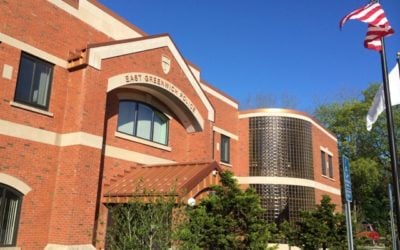George Nicastro stands in front of his house on Frenchtown Road. Credit: EG News
George Nicastro, 87, has been complaining about the water on his property for years, to town officials, state officials, EG police, and state police. Fed up with what he said was a lack of action, he decided to go public – the old-fashioned way – with signs posted in the front yard of his Frenchtown Road house.
“Abused by town and state,” reads one sign. “Marine vet of 2 wars. Age 87,” reads another. A third reads, “Abuse is bad for diabetic.”
“I went through the rules to build this house,” he said in a recent interview. “Here, right now, my land is worth nothing to me.”
Nicastro owns 4.59 acres on a beautiful stretch of Frenchtown Road beyond Shippee Road. Across the street is the Tibbitts farm. While there are houses within view, it’s still a pretty rural spot in a town that’s seen a lot of development in the past few decades.
He and his wife bought the land in 1969. They filled in about a half acre of the property and built a modest house there, with the town’s permission.
“My wife used to think it was an issue when you saw a car go down the road. Now it’s a major highway,” Nicastro said.
They moved to East Greenwich from Pawtucket – it was convenient for Nicastro, who worked at the old Brown & Sharpe facility down Frenchtown Road on the other side of South County Trail.
Nicastro knew the land was wet – hence the need to bring in fill to build the house – but he said it’s wetter now. He blames the town for what he said was increased runoff from the road. Nearby his house to the west is a stream that runs under the road. The stream used to be smaller, he said.
What’s more, Dept. of Environmental Management rules regulating development of wetlands now make his land less valuable, he said.
Rhode Island passed the Freshwater Wetlands Act in 1971, giving the government the authority to preserve, protect, and restore freshwater wetlands. Over the years, regulations got stricker as the benefits of healthy wetlands became more apparent (for more on wetlands, check out RI DEM’s “What’s the Scoop on Wetlands?” here).
“They’ve taken my legacy from me,” Nicastro said.
Both Chuck Horbert, supervising environmental scientist for DEM, and Joe Duarte, director of EG Public Works, agree with Nicastro that his land is probably wetter than it was when he bought it. However, they contend the increased wetness has to do with wetter weather generally.
“You’re talking now close to 40 years in fairly steady progress in increases in precipitation,” said Horbert. “That would … make existing wetlands wetter.”
Horbert said DEM had tightened wetlands regulations over the past 40 years.
“The level of protection these wetlands were afforded has certainly changed since 1971,” he said. “As we gained knowledge about the importance of wetlands, the functions and values that wetlands provide to society, the department became more strict about what it allowed and didn’t allow.”
“We’ve had more severe rainstorms in the last 10 years than ever before,” said Duarte. “We’ve seen at least one significant storm a year. If you live near a wetlands, you will notice these more than any anyone else will.”
He said nothing the town’s done has caused more water to flow onto Nicastro’s land.
“We spend many, many hours and days making sure they don’t increase the runoff,” Duarte said of new developments. Nicastro’s property sits between the Woodbridge and Longmeadow developments.
“It’s a painstaking process that we go through, making sure there’s no net increase in water flow,” he said. “That’s what retention ponds do, when the peak flows increase substantially, that water gets stored in these retention ponds. Development can be bad if it’s not properly done but we spend a lot of time making sure that doesn’t happen.”
For Nicastro, it’s not that he’s being prevented from doing anything at this point. But there was always the promise of developing on another part of his land and he’s worried that won’t be possible. In addition, he said, he shouldn’t have to pay as much in property taxes if his land is so wet.
EG Tax Assessor Janice Peixinho said Nicastro just needs to bring in a report from DEM or a surveyor outlining how much of his property is wetlands and he would get an abatement on his taxes. The Board of Assessment Review has already heard from Nicastro and his case is open, she said – the Town Council would just need to approve it.
Getting such a report, however, costs money. According to Horbert, Nicastro could submit an application for “wetland determination,” which would indicate whether or not he has wetlands on his property and their type.
But to get a tax abatement, Nicastro would need to find out the exact amount of wetlands on his property. That’s done by getting a “verification of a wetland edge,” in which a surveyor or wetlands biologist marks the wetlands edge with flags. A DEM official would then need to go out and verify the flags. Horbert said all of that would probably cost a few thousand dollars.
Nicastro said he just wants his property the way it was when he bought it.
“What I’m looking for is giving me my land the way it was,” he said. “The Town Council didn’t protect my land from wetlands.”
You can see George Nicastro talking about the wetlands on his property here.






 Subscribe
Subscribe